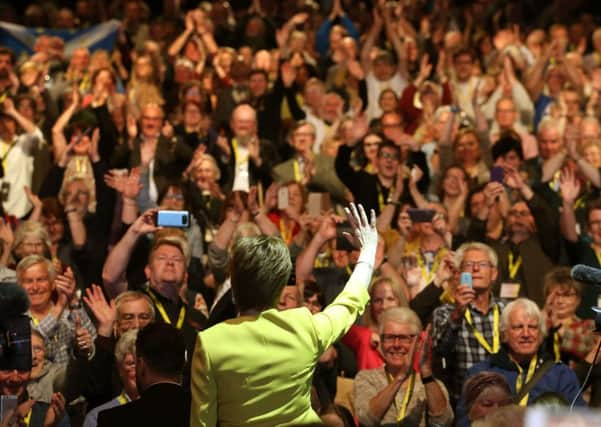Scottish independence: Yes polls make Westminster more likely to say No – Ian Swanson


The weekend poll showing 49 per cent of Scots in favour of independence could not have come at a better time for Nicola Sturgeon and the SNP.
It was published days after the First Minister had announced she wanted a fresh referendum on the issue within the next two years and just as delegates were gathering at the Edinburgh International Conference Centre for the party’s spring conference.
Advertisement
Hide AdAdvertisement
Hide AdEver since the 2014 referendum, the proportion of Scots backing independence has not shifted much from the 45 per cent secured at that time by the Yes campaign.
So does Saturday’s YouGov poll mean Brexit is finally beginning to make more people think that leaving the UK looks like a better option than sticking around to see whether the grim forecasts of shortages, economic disaster and lower standards of living come true?
A separate Panelbase survey on Sunday found a 53-47 split against independence, but that changed to 52-48 in favour of leaving the UK if there was a no-deal Brexit.
Of course, polls are not always to be believed and they do vary. The previous weekend, a different survey put independence on just 39 per cent.
READ MORE:
Advertisement
Hide AdAdvertisement
Hide AdThis weekend’s polls also showed strong support for the SNP in next month’s European elections and on course to win three or four of Scotland’s six seats, while the Tories are in fourth place and risk losing their one MEP. So Ms Sturgeon and the delegates at the EICC had plenty of reasons to be cheerful.
But it seems the idea of a new, independent Scottish currency – the policy the party is now committed to after a major debate at conference – is not particularly popular with voters.
The YouGov poll found just 14 per cent support for the plan to use the pound in the short term before launching a new Scottish currency. Even joining the euro was more popular at 17 per cent, while 48 per cent wanted an independent Scotland to continue using the pound long-term.
The currency was one of the weak points for the Yes campaign in 2014 and helped Alex Salmond lose the first of his TV debates with Labour’s Alistair Darling.
Advertisement
Hide AdAdvertisement
Hide AdSo Ms Sturgeon’s plan for “the biggest campaign on the economics of independence in our party’s history” – including a booklet delivered to all 2.4 million households across the country – could be crucial in trying to win the argument next time.
READ MORE:
But there are still big question marks over whether Indyref2 really will take place in her desired timescale, before the 2021 Holyrood elections. There is the key matter of a Section 30 order which the Scottish Parliament needs from Westminster to hold a referendum – and Theresa May has made clear she will not grant one. Her refusal might not matter if there is a change of Tory leader or a change of government, but the signs are not encouraging that a new prime minister would be any more willing to agree.
Ms Sturgeon has said refusal in the face of growing support for independence would be “unsustainable”. Deputy First Minister John Swinney dismissed opponents’ claims there would be no referendum and if there were, it would be lost. “We’ll soon see about that,” he said.
But if the latest polls are to be trusted, the increase in people ready to vote Yes might make UK politicians even more determined to say No to another vote on Scotland’s future.